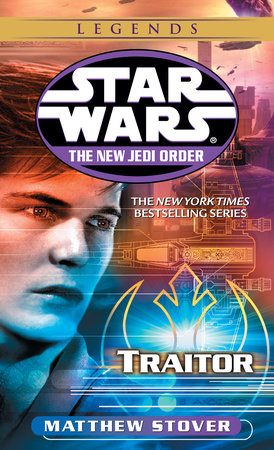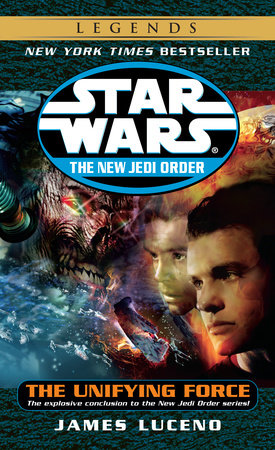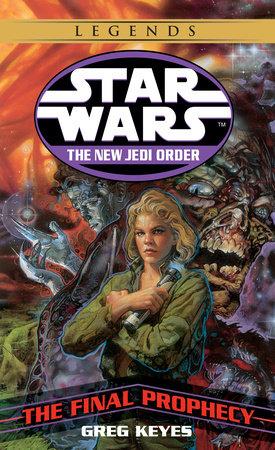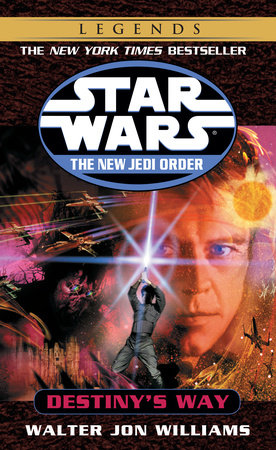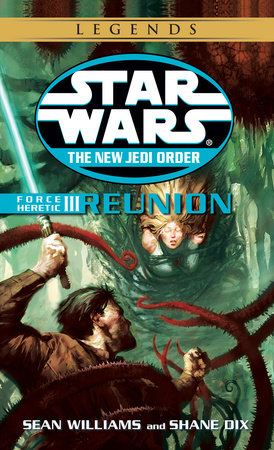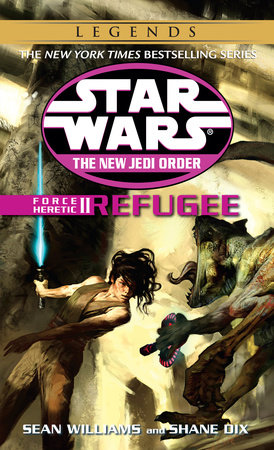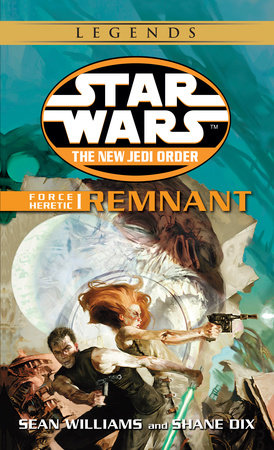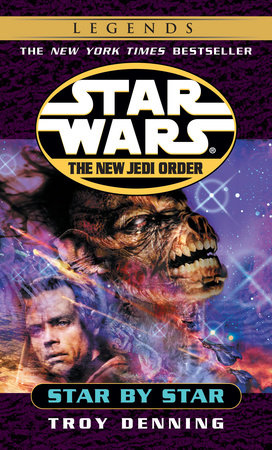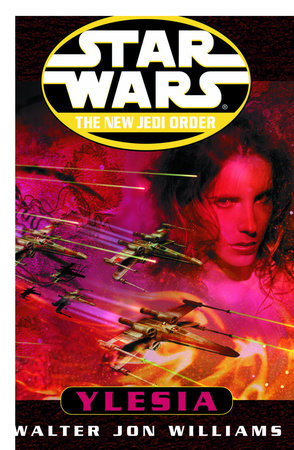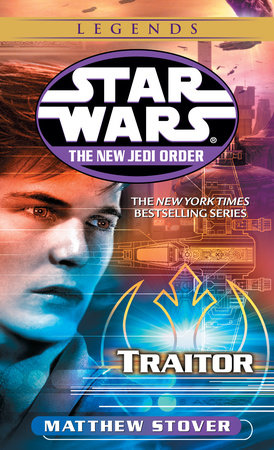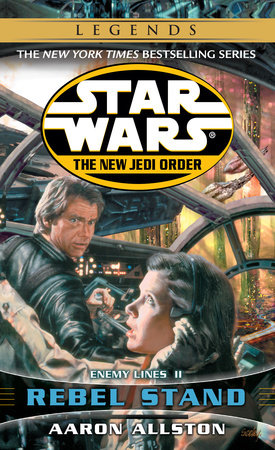Excerpt
Traitor: Star Wars Legends
ONE COCOON
In the dust-swept reaches of interstellar space, where the density of matter is measured in atoms per cubic meter, a small vessel of yorik coral blinked into existence, slewed through a radical curve that altered both its vector and its velocity, then streaked away, trailing a laser-straight line of ionizing radiation, to vanish again in the gamma burst of hyperjump.
Some unknown time later, an unguessable distance away, in a region indistinguishable from the first save by the altered parallax of certain stellar groups, the same vessel performed a similar manuver.
On its long journey, the vessel might fall into the galaxy any number of times, and each time be swallowed once more by the nothing beyond.
Jacen Solo hangs in the white, thinking.
He has begun to riddle out the lesson of pain.
The white drops him once in a while, as though the Embrace of Pain understands him somehow: as though it can read the limit of his strength. When another minute in the white might kill him, the Embrace of Pain eases enough to slide him back into the reality of the room, of the ship; when the pain has crackled so hot for so long that his overloaded nerves and brain have been scorched too numb to feel it, the Embrace of Pain lowers him entirely to the floor, where he can even sleep for a time, while other devices—or creatures, since he cannot tell the difference anymore, since he is no longer sure that there is any difference—bathe him and tend wounds scraped or torn or slashed into his flesh by the Embrace’s grip, and still more creature-devices crawl over him like spider-roaches, injecting him with nutrients and enough water to maintain his life.
Even without the Force, his Jedi training gives him ways to survive the pain; he can drive his mind through a meditative cycle that builds a wall of discipline between his consciousness and the white. Though his body still suffers, he can hold his mind outside the pain. But this wall of discipline doesn’t last forever, and the Embrace of Pain is patient.
It erodes his mental walls with the inanimate persistence of waves against a cliff; the Embrace’s arcane perception somehow lets it know that he has defended himself, and its efforts slowly gather like a storm spinning up into a hurricane until it batters down his walls and slashes once more into everything Jacen is. Only then, only after it has pushed him to the uttermost limit of his tolerance then blasted him beyond that limit into whole new galaxies of pain, will the Embrace slowly relent.
He feels as if the white is eating him—as if the Embrace eats his pain, but never so much that he can’t recover to feed it again. He is being managed, tended like wander-kelp on a Chadian deepwater ranch. His existence has become a tidal rhythm of agony that sweeps in, reaches an infinite crest, then rolls out again just far enough that he might catch his breath; the Embrace is careful not to let him drown.
Sometimes, when he slips down from the white, Vergere is there. Sometimes she crouches at his side with the unblinking predatory patience of a hawk-bat; sometimes she stalks around the chamber on her back-bent legs like a dactyl stork wading through a swamp. Often, she is incongruously kind to him, tending his raw flesh herself with oddly comforting efficiency; he sometimes wonders if she would do more, would say more, if not for the constant monitoring stares of the eyestalks that dangle from the ceiling.
But mostly he sits, or lies, waiting. Naked, blood seeping from his wrists and ankles. More than naked: utterly hairless. The living machines that tend to his body also pluck out his hairs. All of them: head, arms, legs, pubis, armpits. Eyebrows. Eyelashes.
Once he asked, in his thin, weakly croaking voice, “How long?”
Her response was a blank stare. He tried again. “How long . . . have I been here?”
She made the liquid ripple of her flexible arms that he usually took for a shrug. “How long you have been here is as irrelevant as where you are. Time and place belong to the living, little Solo. They have nothing to do with you, nor you with them.”
His questions always meet with answers like this one; eventually he stops asking. Questions require strength, and he has none to spare.
“Our masters serve stern gods,” she said, the second or fifth or tenth time he awoke to find her at his side. “The True Gods decree that life is suffering, and give us pain to demonstrate their truth. Some among our masters seek favor with the True Gods by seeking pain; Domain Shai was legendary for this. They used the Embrace of Pain the way you or I might take a bath. Perhaps they hoped that by punishing themselves, they might avert the punishments of the True Gods. In this, one must suppose they were . . . ah, disappointed. Or perhaps—as Domain Shai’s detractors like to whisper—they grew to enjoy the pain. Pain can be a drug, Jacen Solo. Do you understand this yet?”
Vergere seemed never to care if he didn’t answer; she seemed perfectly content to prattle away endlessly on any random subject, as though interested in nothing beyond the sound of her own voice—but if he so much as lifted his head, as soon as he croaked an answer or murmured a question, the subject somehow turned to pain.
They had plenty to talk about; Jacen had learned a great deal about pain.
His first actual clue to the lesson of pain came once when he lay upon the corded floor, trembling with exhaustion. The branchlike grips of the Embrace of Pain still held him, but loosely, maintaining contact, no more. They hung in slack spirals overhead, dangling from bunched, knotted bundles of vegetative muscle that shifted and squirmed above the leather-barked ceiling of the chamber.
These periods of rest hurt Jacen almost as much as the Embrace’s torment: his body slowly but inexorably dragged itself back into shape, resocketing his joints and achingly releasing the overstretched tension of his muscles. And without the constant agony of the Embrace of Pain, he could think of nothing but Anakin, of the gaping wound that Anakin’s death had opened in his life—and of what Anakin’s death had begun to do to Jaina, driving her toward the dark—and of how his parents must be suffering, having lost both their sons—
More to distract himself than out of any desire for conversation, he had rolled over to face Vergere and asked, “Why are you doing this to me?”
“This?” Vergere gazed at him steadily. “What am I doing?”
“No—” He closed his eyes, organizing pain-scattered thoughts, then opened them again. “No, I mean the Yuuzhan Vong. The Embrace of Pain. I’ve been through a breaking,” he said. “The breaking makes a kind of sense, I guess. But this . . .”
His voice broke despairingly, but he caught himself, and held his tongue until he could control it. Despair is of the dark side. “Why are they torturing me?” he asked, clearly and simply. “No one even asks me anything . . .”
“Why is a question that is always deeper than its answer,” Vergere said. “Perhaps you should ask instead: what? You say torture, you say breaking. To you, yes. To our masters?” She canted her head, and her crest splayed orange. “Who knows?”
“This isn’t torture? You should try it from my side,” Jacen said with a feeble smile. “In fact, I really wish you would.”
Her chuckle chimed like a handful of glass bells. “Do you think I haven’t?”
Jacen stared, uncomprehending.
“Perhaps you are not being tortured,” she said cheerily. “Perhaps you are being taught.”
Jacen made a rusty hacking sound, halfway between a cough and a bitter laugh. “In the New Republic,” he said, “education doesn’t hurt this much.”
“No?” She canted her head to the opposite angle, and her crest shimmered to green. “That may be why your people are losing this war. The Yuuzhan Vong understand that no lesson is truly learned until it has been purchased with pain.”
“Oh, sure. What’s this supposed to teach me?”
“Is it what the teacher teaches?” Vergere countered. “Or what the student learns?”
“What’s the difference?”
The arc of her lips and the angle of her head might have added up to a smile. “That is, itself, a question worth considering, yes?”
There was another time—before, after, he could never be sure. He had found himself huddled against the leathery curve of the chamber’s wall, the Embrace’s grips trailing upward like slack feeder vines. Vergere crouched at his side, and as consciousness trickled through him he seemed to recall that she had been coaxing him to take a sip from the stem of an elongated, gourdlike drink bulb. Too exhausted for disobedience, he tried; but the liquid within—only water, cool and pure—savaged his parched throat until he gagged and had to spit it out again. Patiently, Vergere had used the bulb to moisten a scrap of rag, then gave it to him to suck on until his throat loosened up enough that he could swallow.
The vast desert inside his mouth absorbed the moisture instantly, and Vergere dampened the rag again. This went on for some considerable while.
“What is pain for?” she murmured after a time. “Do you ever think about that, Jacen Solo? What is its function? Many of our more devout masters believe that pain is the lash of the True Gods: that suffering is how the True Gods teach us to disdain comfort, our bodies, even life itself. For myself, I say that pain is itself a god: the taskmaster of life. Pain cracks the whip, and all that lives will move. The most basic instinct of life is to retreat from pain. To hide from it. If going here hurts, even a granite slug will go over there; to live is to be a slave to pain. To be ‘beyond pain’ is to be dead, yes?”
“Not for me,” Jacen answered dully, once his throat opened enough that he could speak. “No matter how dead you say I am, it still hurts.”
“Oh, well, yes. That the dead are beyond pain is only an article of faith, isn’t it? We should say, we hope that the dead are beyond pain—but there’s only one way to find out for sure.” She winked at him, smiling. “Do you think that pain might be the ruling principle of death, as well?”
“I don’t think anything. I just want it to stop.”
She turned away, making an odd snuffling sound; for half a moment Jacen wondered if his suffering might have finally touched her somehow—wondered if she might take pity on him . . .
But when she turned back, her eyes were alight with mockery, not compassion. “I am such a fool,” she chimed. “All this time, I had thought I was speaking to an adult. Ah, self-deception is the cruelest trick of all, isn’t it? I let myself believe that you had once been a true Jedi, when in truth you are only a hatchling, shivering in the nest, squalling because your mother hasn’t fluttered up to feed you.”
“You—you—” Jacen stammered. “How can you—after what you’ve done—”
“What I have done? Oh, no no no, little Solo child. This is about what you have done.”
“I haven’t done anything!”
Vergere settled back against the chamber’s wall a meter away. Slowly, she folded her back-bent knees beneath her, then laced her fingers together in front of her delicately whiskered mouth and stared at him over her knuckles.
After a long, long silence, during which I haven’t done anything! echoed in his mind until Jacen’s face burned, Vergere said, “Exactly.”
She leaned close, as though to share an embarrassing secret. “Is that not the infant’s tactic? To wail, and wail, and wail, to wriggle its fingers and kick its heels . . . hoping an adult will notice, and care for it?”
Jacen lowered his head, struggling against sudden hot tears. “What can I do?”
She sat back again and made more of that snuffling noise. “Certainly, among your options is continuing to hang in this room and suffer. And so long as you do that, do you know what will happen?”
Jacen gave her a bruised look. “What?”
“Nothing,” she said cheerfully. She spread her hands. “Oh, eventually, you’ll go mad, I suppose. If you’re lucky. Someday you may even die.” Her crest flattened back and became blasterbore gray. “Of old age.”
Jacen stared, openmouthed. He couldn’t face another hour in the Embrace of Pain—she was talking about years. About decades.
About the rest of his life.
He hugged his knees and buried his face against them, grinding his eye sockets against his kneecaps as though he could squeeze the horror out of his head. He remembered Uncle Luke in the doorway of the shed on Belkadan, remembered the sadness on his face as he cut through the Yuuzhan Vong warriors who had captured Jacen, remembered the swift sure pressure as Luke gouged the slave seed out of Jacen’s face with his cybernetic thumb.
He remembered that Uncle Luke wouldn’t be coming for him this time. Nobody would.
Because Jacen was dead.
“Is that why you keep coming here?” he muttered into his folded arms. “To gloat? To humiliate a defeated enemy?”
“Am I gloating? Are we enemies?” Vergere asked, sounding honestly puzzled. “Are you defeated?”
Her suddenly sincere tone caught him; he raised his head, and could find no mockery now in her eyes. “I don’t understand.”
“That, at least, is very clear,” she sighed. “I give you a gift, Jacen Solo. I free you from hope of rescue. Can you not see how I am trying to help you?”
“Help?” Jacen coughed a bitter chuckle. “You need to brush up your Basic, Vergere. In Basic, when we talk about the kind of things you’ve done to me, help isn’t the word we use.”
“No? Then perhaps you are correct: our difficulties may be linguistic.” Vergere sighed again, and settled even lower, folding her arms on the floor in front of her and arranging herself on top of them in a way more feline than avian. Secondary inner lids shrouded her eyes.
“When I was very young—younger than you, little Solo—I came upon a ringed moon shadowmoth at the end of its metamorphosis, still within its cocoon,” she said distantly, a little sadly. “I had already some touch with the Force; I could feel the shadowmoth’s pain, its panic, its claustrophobia, its hopelessly desperate struggle to free itself. It was as though this particular shadowmoth knew I was beside it, and screamed out to me for help. How could I refuse? Shadowmoth cocoons are polychained silicates—very, very tough—and shadowmoths are so delicate, so beautiful: gentle creatures whose only purpose is to sing to the night sky. So I gave it what I think you mean by help: I used a small utility cutter to slice the cocoon, to help the shadowmoth get out.”
“Oh, you didn’t, did you? Please say you didn’t.” Jacen let his eyes drift closed, sorry already, for how he knew this story would end.
He’d had a shadowmoth in his collection for a short time; he remembered watching the larva grow, feeling its happy satisfaction through his empathic talent as it fed on stripped insulation and crumbled duracrete; he remembered the young shadowmoth that had emerged, spreading its dusky, beautifully striated wings against the crystalline polymer of its viewcage; he remembered the shadowmoth’s thrilling whistle of moonsong, when he had released it from its viewcage and it had soared away under the mingled glows of Coruscant’s four moons.
He remembered the desperate panic that had beat in waves against him through the Force, the night the shadowmoth had fought free of its cocoon. He remembered his ache to help the helpless creature—and he remembered why he hadn’t.
“You can’t help a shadowmoth by cutting its cocoon,” he said. “It needs the effort; the struggle to break the cocoon forces ichor into its wing veins. If you cut the cocoon—”
“The shadowmoth will be crippled,” Vergere finished for him solemnly. “Yes. It was a tragic creature—never to fly, never to join its fellows in their nightdance under the moons. Even its wingflutes were stunted, and so it was as mute as it was planetbound. During that long summer, we sometimes heard moonsong through the window of my bedchamber, and from my shadowmoth I would feel always only sadness and bitter envy, that it could never soar beneath the stars, that its voice could never rise in song. I cared for it as best I could—but the life of a shadowmoth is short, you know; they spend years and years as larvae, storing strength for one single summer of dance and song. I robbed that shadowmoth; I stole its destiny—because I helped it.”
“That wasn’t helping,” Jacen said. “That’s not what help means, either.”
“No? I saw a creature in agony, crying out its terror, and I undertook to ease its pain, and assuage its fear. If that is not what you mean by help, then my command of Basic is worse than I believed.”
“You didn’t understand what was happening.”
Vergere shrugged. “Neither did the shadowmoth. But tell me this, Jacen Solo: if I had understood what was happening—if I had known what the larva was, and what it must do, and what it must suffer, to become the glorious creature that it could become—what should I have done that you would call, in your Basic, help?”
Jacen thought for some time before answering. His Force empathy had enabled him to understand the exotic creatures in his collection with extraordinary depth and clarity; that understanding had left him with a profound respect for the intrinsic processes of nature. “I suppose,” he said slowly, “the best help you could offer would be to keep the cocoon safe. Hawk-bats hunt shadowmoth larvae, and they especially like newly cocooned pupae: that’s the stage where they have the most stored fat. So I guess the best help you could offer would be to keep watch over the larva, to protect it from predators—and leave it alone to fight its own battle.”
“And, perhaps,” Vergere offered gently, “also to protect it from other well-intentioned folk—who might wish, in their ignorance, to ‘help’ it with their own utility cutters.”
“Yes . . .” Jacen said, then he caught his breath, staring at Vergere as though she had suddenly grown an extra head. “Hey . . .” Comprehension began to dawn. “Hey—”
“And also, perhaps,” Vergere went on, “you might stop by from time to time, to let the struggling, desperate, suffering creature know that it is not alone. That someone cares. That its pain is in the service of its destiny.”
Jacen could barely breathe, but somehow he forced out a whisper. “Yes . . .”
Vergere said gravely, “Then, Jacen Solo, our definitions of help are identical.”
Jacen shifted forward, coming up onto his knees. “We’re not really talking about shadowmoth larvae, are we?” he said, his heart suddenly pounding. “You’re talking about me.”
She rose, legs unfolding like gantry cranes beneath her. “About you?”
“About us.” His throat clenched with impossible hope. “You and me.”
“I must go, now; the Embrace has become impatient for your return.”
“Vergere, wait—!” he said, struggling to his feet, the Embrace’s branch-grips dangling from his wrists. “Wait, Vergere, come on, talk to me—and, and, and shadowmoths—” he stammered. “Shadowmoths are indigenous! They’re not a transported species—they’re native to Coruscant! How could you have found a shadowmoth larva? Unless, unless you—I mean, did you—are you—”
She put her hand between the lips of the mouthlike sensor receptacle beside the hatch sphincter, and the warted pucker of the hatch gaped wide.
“Everything I tell you is a lie,” she said, and stepped through.
The Embrace of Pain gathered him once more into the white.
Jacen Solo hangs in the white, thinking.
For an infinite instant, he is merely amazed that he can think; the white has scoured his consciousness for days, or weeks, or centuries, and he is astonished now to discover that he can not only think, but think clearly.
He spends a white eon marveling.
Then he goes to work on the lesson of pain.
This is it, he thinks. This is what Vergere was talking about. This is the help she gave me, that I didn’t know how to accept.
She has freed him from his own trap: the trap of childhood. The trap of waiting for someone else. Waiting for Dad, or Mother, Uncle Luke, Jaina, Zekk or Lowie or Tenel Ka or any of the others whom he could always count on to fly to his rescue.
He is not helpless. He is only alone.
It’s not the same thing.
He doesn’t have to simply hang here and suffer. He can do something.
Her shadowmoth tale may have been a lie, but within the lie was a truth he could not have comprehended without it. Was that what she had meant when she said, Everything I tell you is a lie?
Did it matter?
Pain is itself a god: the taskmaster of life. Pain cracks the whip, and all that lives will move. To live is to be a slave to pain.
He knows the truth of this, not only from his own life but from watching Dad and Anakin, after Chewie’s death. He watched pain crack its whip over his father, and watched Han run from that pain halfway across the galaxy. He watched Anakin turn hard, watched him drive himself like a loadlifter, always pushing himself to be stronger, faster, more effective, to do more—this was the only answer he had to the pain of having survived to watch his rescuer die.
Jacen always thought of Anakin as being a lot like Uncle Luke: his mechanical aptitude, his piloting and fighting skills, his stark warrior’s courage. He can see now that in one important way, Anakin was more like his father. His only answer to pain was to keep too busy to notice it.
Running from the taskmaster.
To live is to be a slave to pain.
But that is only half true; pain can also be a teacher. Jacen can remember hour after hour of dragging his aching muscles through one more repetition of his lightsaber training routines. He remembers practicing the more advanced stances, how much it hurt to work his body in ways he’d never worked it before, to lower his center of gravity, loosen his hips, train his legs to coil and spring like a sand panther’s. He remembered Uncle Luke saying, If it doesn’t hurt, you’re not doing it right. Even the stinger bolts of a practice remote—sure, his goal had been always to intercept or dodge the stingers, but the easiest way to avoid that pain would have been to quit training.
Sometimes pain is the only bridge to where you want to go.
And the worst pains are the ones you can’t run away from, anyway. He knows his mother’s tale so well that he has seen it in his dreams: standing on the bridge of the Death Star, forced to watch while the battle station’s main weapon destroyed her entire planet. He has felt her all-devouring horror, denial, and blistering helpless rage, and he has some clue how much of her relentless dedication to the peace of the galaxy is driven by the memory of those billions of lives wiped from existence before her eyes.
And Uncle Luke: if he hadn’t faced the pain of finding his foster parents brutally murdered by Imperial stormtroopers, he might have spent his whole life as an unhappy moisture farmer, deep in the Tatooine sand-wastes, dreaming of adventures he would never have—and the galaxy might groan under Imperial rule to this very day.
Pain can be power, too, Jacen realizes. Power to change things for the better. That’s how change happens: someone hurts, and sooner or later decides to do something about it.
Suffering is the fuel in the engine of civilization.
Now he begins to understand: because pain is a god—he has been in the grip of this cruel god ever since Anakin’s death. But it is also a teacher, and a bridge. It can be a slave master, and break you—and it can be the power that makes you unbreakable. It is all these things, and more.
At the same time.
What it is depends on who you are.
But who am I? he wonders. I’ve been running like Dad—like Anakin. I think they stopped, though; I think Dad was strong enough to turn back and face it, to use the pain to make himself stronger, like Mom and Uncle Luke. Anakin did, too, at the end. Am I that strong?
There’s only one way to find out.
For indefinite days, weeks, centuries, the white has been eating him.
Now, he begins to eat the white.
Executor Nom Anor toyed idly with a sacworm of dragweed broth while he waited for the shaper drone to finish its report. He sat human-style on a fleshy hump to one side of the unusually large villip to which the drone addressed its monotonous, singsong analysis of the Embrace chamber’s readings on the young Jedi, Jacen Solo.
Nom Anor had no need to pay attention. He knew already what the drone would say; he had composed the report himself. This particular Embrace chamber was equipped with an exceptionally sophisticated nerve-web of sensors, which could read the electrochemical output of Jacen Solo’s nerves down to each individual impulse and compare the pain they registered with its effect on his brain chemistry. The shaper drone mumbled on and on in its description of minute details of its data collection, and its deadly dull murmur was excruciating—
Perhaps that’s why we call them drones, Nom Anor thought with a humorless interior smile. He did not share this observation with the third occupant of the small, moist chamber. It wasn’t even a joke in any language but Basic, and it wasn’t that funny, anyway.
Instead he simply sat, sipping broth occasionally from the sacworm, watching the villip, waiting for Warmaster Tsavong Lah to lose his patience.
With vegetative accuracy, the villip conveyed the physical features of the warmaster: his tall narrow skull, bulging braincase, dangerously sharp teeth bristling within his lipless gash of a mouth, as well as the proud array of scars that defined his devotion to the True Way. Nom Anor reflected idly how well some of those intricately scarified designs would look on his own face. Not that he had any real interest in the True Way beyond its use as a political tool; from long experience, he knew that the appearance of piety was vastly more useful than its reality could ever be.
The villip also captured perfectly the frightening intensity of Tsavong Lah’s fanatic glare.
That gleam of faith’s power in his eye was the reflection of an inner conviction the like of which Nom Anor could only imagine: to know, beyond the possibility of doubt, that the True Gods stood at his shoulder, guiding his hand in Their service. To know that all truth, all justice, all right, shone from the True Gods like stellar wind, illuminating the universe.
The warmaster was a true believer.
To Nom Anor, faith was an extravagance. He knew too well how easily such true believers can be manipulated by those who believe in nothing but themselves.
This was, in fact, his specialty.
The moment he’d been waiting for came during the drone’s exhaustive point-by-point cross-species interpolation between Jacen Solo’s readings and those of three different control subjects, all Yuuzhan Vong: one warrior caste, one priest caste, and one shaper caste, each of whom had earlier undergone excruciation by the very same Embrace of Pain in which the young Jedi now hung. Anger gathered upon Tsavong Lah’s villip image like the ion peak that precedes a solar flare.
Finally, his patience broke. “Why is my time wasted with this babble?”
The shaper drone stiffened, glancing nervously at Nom Anor. “This data is extremely significant—”
“Not to me. Am I a shaper? I have no interest in raw data—tell me what it means!”
Nom Anor sat forward. “With the warmaster’s permission, I may perhaps be of some service here.”
The villip twisted fractionally to fix Nom Anor with the warmaster’s glare. “You had better,” he said. “My patience is limited—and you personally, Executor, have required too much of it already in recent days. You swing from a thin vine, Nom Anor, and it continues to fray.”
“All apologies to the warmaster,” Nom Anor said smoothly. He gestured dismissal to the drone, which made a hasty obeisance toward the villip, triggered the room’s hatch sphincter, and scuttled away. “I mean only to offer analysis; interpretation is my specialty.”
“Your specialty is propaganda and lies,” Tsavong Lah rasped.
As if there were a difference. Nom Anor shrugged and smiled amiably: gestures he had learned from his impersonations of the human species. He exchanged one quick glance with the other occcupant of the chamber—his partner in the Solo Project—then directed his gaze back to the villip. “The import of the Embrace chamber’s data is exactly this: Jacen Solo has become capable of not only accepting torment, but thriving on it. As the warmaster will recall, I predicted such a result. He has discovered resources within himself of the sort that we find only in our greatest warriors.”
“And?” The warmaster glared. “Make your point.”
“It will work,” Nom Anor said simply. “That is the point. The only point. Based on our current figures, Jacen Solo will inevitably—provided he lives—turn to the True Way with his whole heart.”
“This has been attempted before,” Tsavong Lah growled. “The Jeedai Wurth Skidder, and the Jeedai Tahiri on Yavin Four. The results were less than satisfactory.”
“Shapers,” Nom Anor snorted derisively.
“Mind your tongue, if you would keep it in your mouth. The shaper caste is holy unto Yun-Yuuzhan.”
“Of course, of course. No disrespect intended, naturally. I only mean to point out, with the warmaster’s permission, that the methods used in the Tahiri disaster were crude physical alterations—possibly heretical.” Nom Anor leaned on the word.
Tsavong Lah’s face darkened.
“They were performing sacrilegious research,” Nom Anor went on. “They tried to make her into a Yuuzhan Vong—as though a slave can be altered into one of the Chosen Race. Is this not blasphemy? The ensuing slaughter was far kinder than they deserved, as the warmaster will no doubt agree.”
“Not at all,” Tsavong Lah countered. “It was precisely what they deserved. Whatever the Gods decree is the definition of justice.”
“As you say,” Nom Anor conceded easily. “No such heresy will take place in the Solo Project. The process with Jacen Solo is precisely the opposite: he will remain fully human, yet acknowledge and proclaim the Truth. We will not have to alter or destroy him in any way. We merely demonstrate; he will do the rest himself.”
The warmaster’s image chilled over with calculation. “You still have not made clear why I should desire this. Everything you have told me implies that he would make an even greater sacrifice than I had dreamed. Explain why I should await this promised conversion. Should he die in the process, I will have broken an oath to the True Gods: cheated them of their due sacrifice. The True Gods are unforgiving to oathbreakers, Nom Anor.”
You couldn’t prove it by me, Nom Anor thought smugly, but he spoke with utmost respect. “The symbolic importance of Jacen Solo cannot be overestimated, Warmaster. First, he is Jedi—and the Jedi stand in place of gods in the New Republic. They are looked to as surrogate parents, gifted with vast abilities that legend further magnifies beyond all reason; their purpose is to fight and die for the New Republic’s debased, infidel perversions of truth and justice. Jacen Solo is already a legendary hero. His exploits, even as a child and a youth, are known throughout the galaxy; together with those of his sister—his twin sister—they rival even those of Yun-Harla and Yun-Yammka—”
“You utter such blasphemies too easily,” Tsavong Lah grated.
“Do I?” Nom Anor smiled. “And yet the True Gods do not see fit to strike me down; perhaps what I say is not blasphemy at all—as you shall see.”
The warmaster only glared at him stonily.
“Jacen Solo is also the eldest son of the galaxy’s leading clan. His mother was, for a time, the New Republic’s Supreme Overlord—”
“For a time? How is this possible? Why would her successor let her live?”
“Does the warmaster truly wish a disquisition upon the New Republic’s perverse system of government? It has to do with a bizarre concept called democracy, in which ruling power is given to whomever is most skillful at directing the herd instincts of the largest masses of their most ignorant citizens—”
“Their politics are your concern,” Tsavong Lah growled. “Their fighting strength is mine.”
“The two are, in this case, more closely related than the warmaster might suspect. For a quarter of a standard century, the Solo family has dominated galactic affairs of all kinds. Even the warmaster of the Jedi is none other than Jacen Solo’s uncle. This uncle, Luke Skywalker, is popularly considered to have singlehandedly created the New Republic by defeating an older, much more rational government called the Empire. And, I might add, it is fortunate for us that he did; the Empire was vastly more organized, powerful, and potently militaristic. Lacking the internal divisions we have exploited so successfully in the New Republic, the Empire could have crushed our people utterly in their first encounter.”


